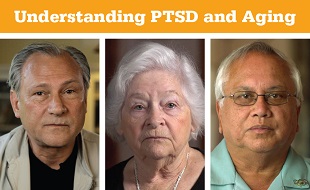“The PTSD will hit you hardest when you retire or you're not occupied all the time.”
Louis Bickford
U.S. Navy
1967-1978
Posttraumatic stress disorder (PTSD) can affect people at any age. Older adults, those 65 and above, are less likely to have PTSD than younger adults. Those who do have it may experience PTSD symptoms differently. The good news is that PTSD treatment works well at any age. Learn more about how PTSD may be different for older adults, including Veterans.
Reading time: minutes
Posttraumatic stress disorder (PTSD) affects people of all ages, including older adults. Most often, “older” refers to people ages 65 or more. As we age, we experience life differently and this can impact how PTSD symptoms affect us. Some older adults with PTSD have long-lasting (or chronic) symptoms that increase or decrease over time. For others, even when PTSD has been treated and managed earlier in life, symptoms return. Changes to lifestyle and activities are common for older adults, like retirement or health problems. For those with PTSD, this can lead to increased symptoms. It is also possible to develop PTSD for the first time as an older adult, due to a late-life traumatic experience.
PTSD may be a bit less common in older adults compared to younger adults. A national study found that only 3 out of every 100 (or 3%) of adults aged 65 or older will have PTSD at some point in their lifetime. For adults under age 65 in the U.S., 7 out of every 100 (or 7%) report having PTSD. Older Veterans are also less likely to have PTSD than younger Veterans.
Although we don’t know for sure why PTSD is less common in older adults, here are some possible reasons:
Older adults can experience PTSD differently than those who are younger. This can be true even if someone has PTSD from an earlier point in life. The way symptoms affect them can be different as they age. Older adults may notice PTSD symptoms more. Here are some examples:
PTSD treatment works for people of all ages. It’s never too late to heal. Evidence-based treatments, including talk therapy (or psychotherapy) and medications work for older adults.
At the same time, it is valuable to talk to your mental health care provider about what treatment plan is best for you. Some things to consider:
Taking care of yourself when you have symptoms of PTSD is important at any age. Although older adults may have different options, the same things that are important earlier in life matter as we age. Healthy aging includes social support and staying connected. Volunteer or group activities are helpful. Learn more about self-help and coping resources for anyone who has PTSD.
Educational Booklet
Understanding PTSD and Aging
This booklet talks about the challenges faced in later life as a result of PTSD and treatment options. English | en Español (PDF)

As we age and become older adults, many things about our life and health can change. If you have PTSD as an older adult, the best treatments can work for you too. Evidence-based treatments work whether you have PTSD from an earlier point in your life or develop it from a late-life traumatic event. It’s never too late to get help.
You May Also Be Interested In